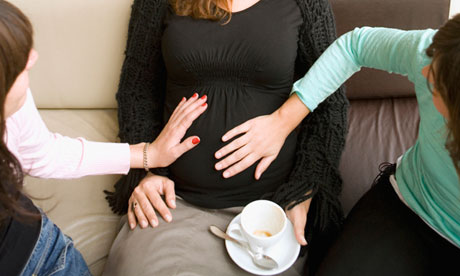
Women should consider giving up coffee in pregnancy, according to a scientist whose study found that drinking even a single mug a day appeared to reduce baby birthweights.
The research on nearly 60,000 women found that even low levels of the stimulant raised the risk of babies being born with a lower weight than expected. Coffee was the source of most of the caffeine the women consumed, but for those who avoided the drink, the main contributions came from tea and chocolate.
The report led by Norwegian Institute of Public Health suggests that drinking 200-300mg of caffeine per day raised the risk of a baby being born "small for gestational age" (SGA) by between 27 and 62%, depending on how the condition was defined. A child that was expected to be born with the average birthweight of 3.6kg lost 21-28g for every 100mg of caffeine the mother consumed each day, the scientists say in the journal BMC Medicine. Caffeine from any source seemed to reduce birthweights.
The Food Standards Agency in Britain advises pregnant women to limit their caffeine intake to no more than 200mg per day. A survey by the agency found that a mug of filter coffee contained around 140mg of caffeine.
Verena Sengpiel, at Sahlgrenska University Hospital in Sweden, said those limits might not be low enough. "We don't find any threshold limit. From the first milligram of caffeine there's an increased rate of SGA," Sengpiel said. "If women want to be cautious and don't have any problems with giving up caffeine, they should try to quit. Otherwise, stick to the guidelines and limit your intake to less than 200mg of caffeine a day," she added.Children who are born small given the length of the pregnancy are prone to various medical problems, including an inability to regulate their temperature and blood glucose levels. Some SGA babies are slow to meet key development milestones, such as speaking, Sengpiel added.
Though the babies lost only a little weight, it was enough to make some of them small enough at birth to be a concern.
Because the study was based on observations, it is impossible to be sure that caffeine is the cause, but the scientists accounted for smoking and other factors known to affect birthweight. They now plan to follow up the medical records of the children to see if they experienced any developmental problems in the early years of life.The findings build on the work of other researchers who have suggested women reduce their caffeine intake during pregnancy. In 2008, doctors at the University of Leicester, and funded by the Food Standards Agency, reported in the British Medical Journal that caffeine might restrict the growth of babies in the womb.
The Food Standards Agency said its advisers, the Committee on Toxiciology, could not identify a level of caffeine that was so low it posed no increased risk to babies. "It seems likely that risk is increased in association with intakes in the order of 200 mg per day and perhaps even lower," they said.

